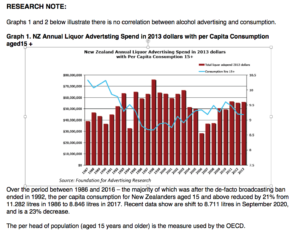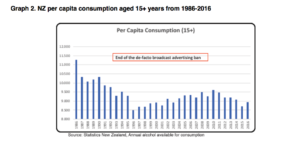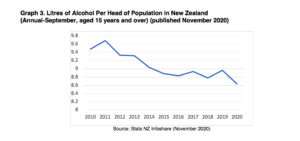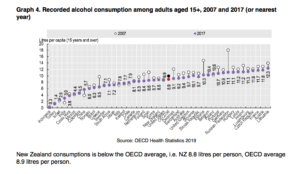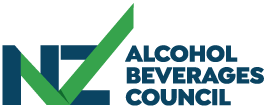MEDIA RELEASE 16 December 2020
NZ Alcohol Beverages Council (NZABC) members remain committed to responsible advertising and acknowledge the refreshed Alcohol Advertising and Promotion Code released by the Advertising Standards Authority today.
“Acting responsibly to ensure advertising adheres to the Code is extremely important to us, and the industry respects the strong advertising restrictions in place. The changes to the Code are relevant to our modern and changing environment and also reflect some of the activities that the industry has been proactively working on, for example, global partnership initiatives with online platforms to help ensure that young people are not exposed to online alcohol advertising,” says NZABC Executive Director, Bridget MacDonald.
“Many people think that advertising increases consumption, but this is simply not true. The fact is consumption in New Zealand has been steadily falling over the past decade or so,” says Bridget.
“Advertising is all about brand promotion and tends to influence a consumer’s brand preferences or strengthens a company’s brand positioning rather than increasing consumption,” she says.
Globally, virtually all research has found that alcohol marketing, such as sports sponsorship or social media advertising, has no or very modest effects on overall alcohol consumption. Research shows consumption in New Zealand has actually dropped, even while marketing spend has increased. [see Research Note below]
“However, the industry remains committed to adhering to the voluntary Code. We support its intention to promote high social responsibility standards when it comes to alcohol advertising and marketing, and its aim to reduce alcohol-related harm and look after the interests of our young and vulnerable people,” says Bridget.
“Due to the already stringent rules and regulations in place, most Kiwis are comfortable with what they see in terms of alcohol advertising and sponsorship. Recent industry research shows that 62% of New Zealanders think the level of industry sponsorship of sport is about right or could be more (25% say its too much). Sixty-six per cent say current levels of advertising are acceptable or could be more (28% say its too high),” says Bridget.
“Our advertising, marketing, social media and sponsorship activities are strongly regulated through the Advertising Standards Authority, so our use of it is open, transparent and we work hard to communicate with people over 18 years of age only. Revisions to the Code brings it into the current environment, and the changes are mostly aligned with actions the industry is already working on,” says Bridget.
Earlier this year, the International Alliance for Responsible Drinking (IARD) and its members announced five key actions the alcohol industry was working on to accelerate efforts to reduce underage drinking globally. This includes introducing symbols or written age restrictions to labels on alcohol drinks and a commitment to not marketing alcohol-free extensions of alcohol brands to underage people. It also consists of a partnership between IARD members and leading digital platforms (Facebook, Instagram, Snapchat and YouTube) that will see new standards of marketing responsibility developed and rolled out worldwide to prevent underage people from seeing or interacting with their alcohol brands online. Online safeguards and age restriction labels aim to be at least 95% in place by 2024. The full set of actions can be found at http://bit.ly/IARDactions.
“We are seeing a reduction in harmful drinking in New Zealand, especially amongst young people, and underage drinking is declining. While NZABC acknowledges misusing or abusing alcohol can cause harm, targeted education and support programmes are critical to educating young people on alcohol-related harm and encouraging adults to drink responsibly,” she says.
“Efforts like safeguards around young people’s access to online alcohol marketing are a step in the right direction. But, we are also supporting local education initiatives like Smashed delivered by Life Education Trust. This theatre in schools programme helps Year 9 students to have a better understanding of the negative effects of alcohol and equips them to deal with real–life situations where there may be peer pressure to drink alcohol. Together, through education and by taking practical steps to reduce underage drinking, we can make a difference in our communities and our young people’s lives,” says Bridget.
Cheers NZ (cheers.org.nz), funded by the industry, delivers social marketing initiatives to shift parents’ attitudes towards underage drinking and to support them in being better role models.
ENDS
Need more information?
• Check out cheers.org.nz and alcoholandme.org.nz for more information on what a standard drink is and how to make better drinking decisions.
• Ministry of Health/HPA Guidelines: Low-risk alcohol drinking advice to reduce your long-term health risks by drinking no more than:
– Two standard drinks a day for women and no more than 10 standard drinks a week,
– Three standard drinks a day for men and no more than 15 standard drinks a week,
– AND have at least two alcohol-free days every week.
Need help?
Call the Alcohol Drug Helpline on 0800 787 797, free txt 8681, or visit alcoholdrughelp.org.nz.
